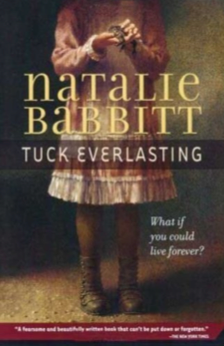
Tuck Everlasting is the story of a girl named Winnie and a family whom she meets, the Tucks. The Tucks have a secret; they're immortal. They drank water from a spring that was actually a fountain of youth. Until the end of time, they will stay that way. Winnie falls in love with one of the Tucks, Jesse, a "17"-year-old boy who shares the same feelings for her. Scared of death, Winnie must choose between being immortal and staying with Jesse, or following the circle of life and dying one day. The Tucks try to teach Winnie that she shouldn't fear death and how they would give anything to die. This story teaches the importance and understanding of life and death. It shows that you should not fear death, but to fear an unlived life. This relates to the fact that so many people who are diagnosed with tragic diseases would love so much to live longer. On the other hand, however, there are also people who wish they would die and in fact, take their own lives. This story says that it’s not about the amount of time you live; it’s more about what you do and how you fulfill your time on earth.
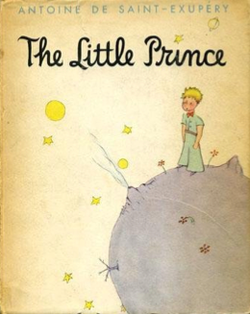
In the first chapter, we meet the narrator who, as a young boy, uses his imagination to draw pictures. But when he, the Little Prince, shows them to the adults, they reject the artwork, and he quickly decides to discard his drawing and "grow up." Throughout the book the Little Prince is taught to be patient and to participate in hard work to keep his "planet" in order. The prince falls in love with a rose that takes root in his planet, who appears to not return his love due to her vain nature. He leaves to see what the rest of the universe is like, and visits six other asteroids, each of which is occupied by an adult who is foolish in his own way. In many cases, his adventures lead the Little Prince to not want to grow up and move on to the next phase. As he is constantly shut down by his elders, he begins to realize that maybe having imagination isn’t such a bad thing after all, and that maybe adults need more of it. This story brings up the question of “When does someone become an adult?” Does it really have to do with age at all? Or is it all about mindset? Does becoming an adult occur from an event, happy or sad? This book shows that becoming an adult is all about mindset, which was a popular response we received from our survey.
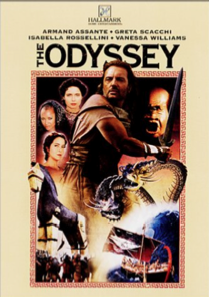
The Odyssey is one of two major ancient Greek epic poems credited to Homer. The poem mainly focuses on the Greek hero, Odysseus, and his long journey home following the fall of Troy. It takes Odysseus ten years to reach Ithaca after the ten-year Trojan War. In his absence, it is assumed he has died, and his wife, Penelope and son, Telemachus must deal with a group of unruly suitors competing for Penelope’s hand in marriage. During this time period, people felt it was fulfilling to die if they had died in war. Penelope goes through the phases of grief without her husband. Overtime this story shows the transitions of many characters dealing with the absence of Odysseus.

Gilgamesh is the main character in the book Gilgamesh. Gilgamesh was never aware of what it was like to love someone until he had met the half animal, half human, Enkidu. After defeating the great Humbaba and the Bull of Heaven, the two new friends are struck with the tragic information that one of them has to die due to their sins. Considering Gilgamesh was half god, Enkidu was automatically chosen to die. Enkidu sees that Gilgamesh is crying as they are saying goodbye. In the last phase of life, people often look back on the past to determine if they have fulfilled their duty. This brings up the question of “How does one know when they have fulfilled their duties of life?” Enkidu hadn’t lived a long life, but he was definitely sure that he had a large impact on Gilgamesh. Before, Gilgamesh was a heartless man who would rape women just because he could. Now, Gilgamesh learned what it was like to feel and to love. And unfortunately, he had to learn how to cope with the phases of grief as well.
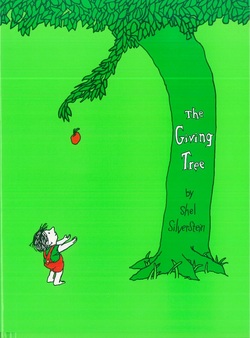
The Giving Tree is a story about the relationship between a young boy and a tree in a forest. The tree always provides the boy with what he wants: branches on which to swing, shade in which to sit, apples to eat, branches with which to build a home. As the boy grows older he requires more and more of the tree. The tree loves the boy very much and gives him anything he asks for. In the final act of self-sacrifice, the tree lets the boy cut it down, so the boy can build a boat in which he can sail. The boy leaves the tree, now a stump. Many years later, the boy, now an old man, returns and the tree says, "I have nothing left to give you." The boy replies, "I do not need much now, just a quiet place to sit and rest." The tree then says, "Well, an old tree stump is a good place for sitting and resting. Come boy, sit down and rest." The boy obliged and the tree was happy. This tale emphasizes the idea that people’s needs and wants change throughout the multiple phases of life.

The word Siddhartha is made up of two words in the Sanskrit language: siddha (achieved) and artha (meaning or wealth). The two words together mean "he who has found meaning of existence" or "he who has attained his goals". Siddhartha goes from asceticism, to a very worldly life as a trader with a lover, and back to asceticism as he attempts to achieve this goal. Asceticism is the idea that a person can attain a high spiritual and moral state by practicing self-denial. This book represents the many different phases that occur in one's life, and the differentiation of phases one has to go through in order to achieve their goals and obtain their desires.

The Five People You Meet in Heaven is a novel by Mitch Albom. It recounts the life and death of an old maintenance man named Eddie. After dying in an accident, Eddie finds himself in the five heavens of the five people he will meet in heaven, where he meets five people who have greatly affected his life, whether he realized it at the time or not. This book was written to make people who felt unimportant in their lives to realize how much they mattered and were loved. This is definitely a major aspect of the last phase of life. Connecting to the book Gilgamesh, in which we evaluate whether or not Enkidu had a fulfilling life, we see that in the last phase, people tend to assess their self worth and impact on themselves and others. As we can see, many books focus on the importance of the last phase of life and the mindset that is involved with it.

In Firefly Lane, the author takes the reader inside a 30-year friendship between two friends. Kate Mularkey, a high school nerd, meets her new neighbor, Tully Hart, and they instantly form a wonderful friendship. The book shows how their relationship grows as they mature, go to college, get jobs, and start their own families. As they continue to enter different phases of life, new conflicts arise. It is obvious through the book that problems that people face get more difficult as they grow up. It is also clear that people mature at different times. Kate and Tully both have different adult aspects to their personalities even though they are the same age. In this book, the reader can see that as people get older, they have greater expectations from their friends as well.
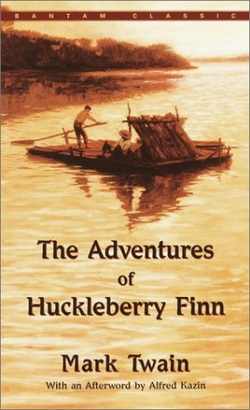
In this story, the snake biting the runaway slave, Jim, had greater symbolism than just the superstition that a snake initiates evil things to occur. The story explains that Huck, the main character, put the snake on Jim to frighten him. Little did Huck know that this would turn into a serious incident. Perhaps Mark Twain was trying to portray the differences of seriousness between certain adults and children. He could very well be portraying that children don't always know the limit. Huck was just trying to have some fun; he was trying to get some amusement out of Jim's reaction to the snake. In the end, he actually seriously injured his friend, Jim. This is just one example of the major differences between a child's idea of "fun" and an adult's.
After the Flood, We
In this poem, the people who had experienced the tragic flood are forced to go through the phases of recovery and rebuilding not only their homes and communities, but themselves and their minds as well.
Old Men Admiring Themselves in the Water
This short poem emphasized how people feel in the last phase of life. The men look into the water and observe their own reflections, and see that they look extremely aged. The title is interesting because in the poem, the men’s appearances don’t seem so admirable. However, we must keep in mind that admiration comes with perspective and opinion.
